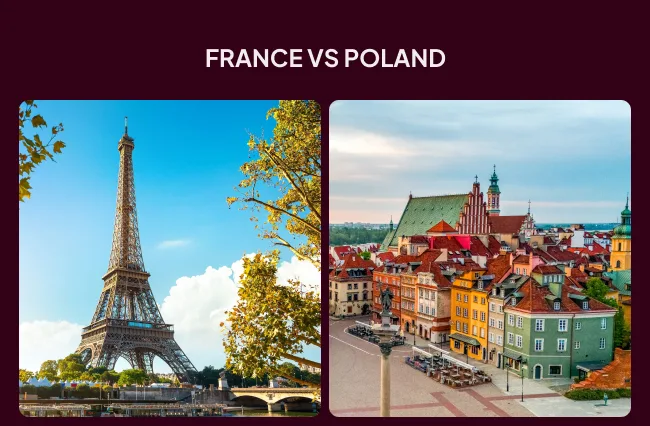Expanding your business into Europe requires more than just a good idea, it demands a clear strategy and the right jurisdiction. France and Poland stand out as two attractive, yet very different, options for company formation. France is known for its well-developed infrastructure, Western EU access, and innovation hubs. Poland offers cost-effective operations, a tech-savvy workforce, and strategic positioning in Eastern Europe.
Choosing the right country for your business depends on a variety of factors industry, market access, startup costs, taxation, and local regulations. This guide will explore the critical differences between Poland vs France company formation and help you make an informed decision for your European expansion.
France and Poland as Business Destinations
France has one of the largest economies in Europe, with a GDP exceeding €3 trillion and a population of over 67 million. It is a leading player in aerospace, pharmaceuticals, automotive, and luxury goods. Major cities like Paris, Lyon, and Marseille are home to vibrant startup ecosystems, R&D hubs, and international business networks. Poland, with a population of over 37 million and a growing GDP, is one of Central and Eastern Europe’s strongest economies.
It excels in IT services, manufacturing, logistics, and outsourcing. Cities like Warsaw, Kraków, and Wrocław are rising stars in tech and innovation, attracting global investors and startups. Both countries are EU members, offering access to the single market, funding opportunities, and free movement of goods and services.
Incorporation Process – How Easy Is It to Start a Business?
Setting up a company in France typically involves several bureaucratic steps. Businesses must register with the Registre du Commerce et des Sociétés (RCS), often with the assistance of a notary. Entrepreneurs must also open a bank account to deposit share capital and obtain a SIREN number from the INSEE (French statistical body). Despite some digital reforms, the French process remains formal and paper heavy.
Poland, on the other hand, has streamlined its procedures. Company formation can be done online via the KRS (National Court Register) using the S24 e-registration system. There is usually no need for a notary and share capital can be deposited quickly. The entire setup can be completed within a few working days, making Poland one of the fastest countries for digital company formation in the EU. Language can also be a barrier official documents in France are in French, and translations may be required. In Poland, while Polish is the legal language, many services offer bilingual support, especially in tech hubs.
Legal Entity Types Available
In France, foreign investors typically choose between SARL (private limited liability company), SAS (simplified joint-stock company), or SA (public limited company). These structures provide limited liability protection and flexibility in governance, especially the SAS for startups.
In Poland, the most common forms are Sp. z o.o. (limited liability company) and S.A. (joint-stock company). The Sp. z o.o. is especially popular among SMEs due to its low capital requirements and straightforward management structure. Both countries allow full foreign ownership and provide strong legal frameworks for limited liability.
Cost of Incorporation and Maintenance – Which Country Is More Cost-Efficient?
France generally involves higher upfront and ongoing costs. Entrepreneurs may need to pay notary fees ranging from €1,000 to €2,000, depending on the complexity. The minimum share capital for an SARL is €1 (though €1,000+ is recommended). Additionally, accounting fees, payroll taxes, and social security contributions can be relatively high.
Poland is known for its affordability. The share capital for a Sp. z o.o. is only PLN 5,000 (approximately €1,100), and registration fees are modest. Notary services are not always required, and the availability of English-speaking accountants and legal advisors makes the process smoother. Annual maintenance costs, including compliance and reporting, are also lower in Poland.
Taxation Environment – Comparing Corporate Tax and VAT
France imposes a standard corporate income tax rate of 25%. VAT is set at 20%, and dividend withholding tax is 30% (though treaty benefits may apply). While France offers R&D tax credits and innovation grants, the tax compliance process can be complex. Poland offers a more competitive corporate tax rate: 19% for most companies and just 9% for small businesses with annual revenue below €2 million. VAT stands at 23%, and dividend withholding tax is 19%. The Polish system is increasingly startup-friendly, with tax incentives for innovation, IP development, and regional investment.
Tax Comparison Table
| Tax Feature | France | Poland |
| Corporate Tax Rate | 25% | 19% (9% for small firms) |
| VAT Rate | 20% | 23% |
| Dividend Withholding Tax | 30% (reduced by treaties) | 19% |
| Startup Incentives | R&D Credit, Innovation Grants | Lower CIT, regional support |
Employment, Labour, and HR Regulations
Hiring in France comes with strict labour protections. Employers must provide long-term contracts, contribute to high social security charges, and adhere to strong employee rights. Payroll systems are sophisticated, but complex. Poland offers greater flexibility in employment. Labour laws are less rigid, and payroll taxes are lower compared to France. The availability of a skilled and tech-literate workforce particularly in IT and engineering makes it easier to scale operations. Both countries require employment contracts and registration with labour authorities, but Poland’s approach is more agile.
Business Culture and Regulatory Environment
France is known for its formal and hierarchical business culture. Establishing trust and long-term relationships is important, and face-to-face meetings are often preferred. French is the primary business language, and the tone tends to be conservative and diplomatic.
Poland presents a more pragmatic and direct approach to business. Communication is straightforward, and younger professionals are typically fluent in English. The regulatory environment is increasingly transparent, supported by strong anti-corruption efforts and digital systems.
Access to EU and Global Markets
France offers unmatched access to Western Europe and Northern Africa. Its extensive rail, road, and air networks make it ideal for companies looking to serve high-value consumer markets. French ports and logistics infrastructure are among the best in Europe.
Poland, situated at the crossroads of East and West, is a gateway to Central and Eastern Europe. It offers logistical advantages for businesses targeting German, Baltic, and Balkan markets. Its lower operating costs and proximity to growing economies make it ideal for production, warehousing, and cross-border trade.
Advantages of Incorporating in France
France’s strengths lie in its world-class infrastructure, established reputation, and access to grants and innovation ecosystems. Paris, Lyon, and Marseille offer access to global markets and startup accelerators.
Companies operating in luxury goods, aerospace, pharmaceuticals, and finance benefit from the country’s ecosystem. France also provides strong IP protection and a highly skilled workforce.
Advantages of Incorporating in Poland
Poland’s lower cost base, tech talent pool, and streamlined registration process make it especially appealing for startups and SMEs. It’s also a top destination for outsourcing and IT development.
The country is strategically positioned to support cross-border trade with Eastern Europe and beyond. Investors benefit from a dynamic labour market, regional development grants, and simplified tax structures.
Which Country Should You Choose?
If your business prioritises prestige, access to Western European markets, and long-term brand-building in established sectors, France might be the better fit. However, if you need a cost-efficient, fast, and tech-friendly environment, Poland has clear advantages.
Consider the following factors
- Your startup budget and how quickly you need to incorporate
- Whether your market is West-facing or East-facing
- Your need for talent in tech, engineering, or digital sectors
- Sector-specific needs (e.g., manufacturing in Poland vs luxury in France)
Ultimately, your decision should align with your long-term strategy, funding model, and operational priorities.
How We Can Help?
We simplify the process of expanding your business into France or Poland. Our services are tailored to help you
- Choose the right legal entity and jurisdiction
- Navigate incorporation paperwork and regulatory obligations
- Secure VAT, tax, and labour registrations
- Establish local offices and open bank accounts
- Stay compliant with annual filing and HR laws
With expert support and multilingual service, we ensure a smooth experience from strategy to execution.
Conclusion
The choice between Poland vs France company formation is not one-size-fits-all. France offers prestige, infrastructure, and high-value markets, while Poland delivers speed, flexibility, and cost savings. Whether you’re launching a new venture or expanding your existing operations, the key is to align your decision with your strategic goals. Contact our expert team today to receive tailored advice and take the first step toward successful European expansion.



